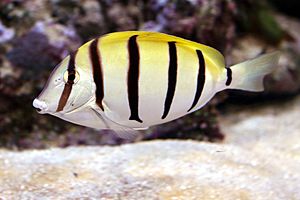Convict surgeonfish facts for kids
Quick facts for kids Convict surgeonfish |
|
|---|---|
 |
|
| Conservation status | |
| Scientific classification |
|
| Kingdom: | Animalia |
| Phylum: | Chordata |
| Class: | Actinopterygii |
| Order: | Acanthuriformes |
| Family: | Acanthuridae |
| Genus: | Acanthurus |
| Species: |
A. triostegus
|
| Binomial name | |
| Acanthurus triostegus (Linnaeus, 1758)
|
|
| Script error: The function "autoWithCaption" does not exist. | |
| Synonyms | |
|
Teuthis elegans Garman, 1899 |
|
Script error: No such module "Check for conflicting parameters".
The convict tang, also known as the convict surgeonfish or manini, is a small fish from the surgeonfish family. It's usually about 17 cm (6.7 in) long, but some can grow up to 27 cm (11 in). These fish are found in many places around the world. You can spot them in the Indo-Pacific Ocean, near the Hawaiian Islands, and in the eastern Pacific from the Gulf of California down to Panama. They have even been seen in the Mediterranean and Adriatic Sea, likely arriving through the Suez Canal.
What Does the Convict Tang Look Like?
The convict tang gets its name from the bold black stripes on its yellowish body, which look a bit like a prisoner's uniform. This fish has a flat, oval shape, like a pancake, and can grow up to 26-27 cm (10-11 in) long.
Its head is small with a pointy snout and a mouth at the very front, which has thick lips. It has six black stripes. This helps tell it apart from the zebra tang, which has nine stripes and lives in a smaller area of the Indian Ocean. One of the black stripes goes right through its eye. The convict tang also has two black spots near its tail. On each side of its tail, it has a sharp, hidden spine that it can pop out to defend itself or fight.
Where Do Convict Tangs Live?
Convict tangs live in warm, tropical parts of the Indo-Pacific region. Their home stretches from the coast of East Africa and Madagascar all the way to southwestern Japan, Australia, and Central America. They also live around many Pacific islands.
You can find these fish swimming over rocky areas in calm lagoons, on the slopes of coral reefs, in bays, and even in estuaries (where rivers meet the sea). Young convict tangs often hang out in tide pools, which are small pools of water left behind by the tide. Older, larger fish can be found in deeper waters, sometimes as deep as 90 m (300 ft).
See also
 In Spanish: Cirujano convicto para niños
In Spanish: Cirujano convicto para niños
 | Madam C. J. Walker |
 | Janet Emerson Bashen |
 | Annie Turnbo Malone |
 | Maggie L. Walker |


